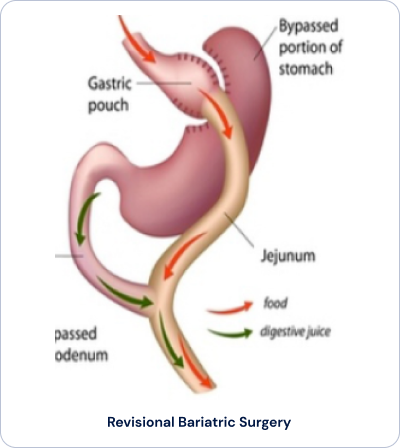- Gastric band removal:
If a patient has had a gastric banding procedure, revisional surgery may involve removing the band and converting to a
different procedure, such as a sleeve gastrectomy or gastric bypass. - Stomach pouch resizing:
Revisional surgery may involve resizing the stomach pouch if it has stretched or become too large, which can occur after
gastric bypass or sleeve gastrectomy. - Malabsorptive procedure conversion:
If a patient has had a restrictive bariatric surgery, such as gastric banding or sleeve gastrectomy, and has not
achieved adequate weight loss, revisional surgery may involve converting to a malabsorptive procedure such as a duodenal
switch or a distal bypass. - Revision of anastomosis:
If a patient has undergone gastric bypass surgery and has experienced complications such as anastomotic stricture or
pouch dilation, revisional surgery may involve repairing or revising the anastomosis. - Revision of the duodenal switch:
If a patient has had a duodenal switch procedure and is experiencing complications such as malnutrition or excessive
weight loss, revisional surgery may involve revising the procedure to address these issues.
Revisional Bariatric Surgery Benefits
Revisional bariatric surgery in Lahore, also known as weight loss surgery revision, is a procedure performed on patients who have
previously undergone weight loss surgery. The benefits of revisional bariatric surgery include:
- Improved weight loss:
Revisional bariatric surgery can help patients achieve further weight loss if they have not met their weight loss goals
after the initial surgery. - Improved comorbidities:
Patients who have undergone revisional bariatric surgery may experience improvement or resolution of comorbidities such
as type 2 diabetes, high blood pressure, and sleep apnea. - Improved quality of life:
Revisional bariatric surgery can improve a patient’s physical and mental well-being, leading to improved self-esteem and
overall quality of life. - Correction of previous surgery complications:
Revisional bariatric surgery can address complications that may have arisen from the initial surgery, such as gastric
pouch dilation, band slippage, or staple line disruption. - Reduced risk of future complications:
Revisional bariatric surgery can reduce the risk of future complications by correcting issues that may have contributed
to the initial surgery’s failure. - Customization of the procedure:
Revisional bariatric surgery can be customized to meet a patient’s unique needs, allowing for a personalized approach to
weight loss and improvement of comorbidities.

Revisional Bariatric Surgery Procedure
Revisional bariatric surgery in Lahore is a complex procedure that may vary depending on the patient’s specific circumstances and
the type of initial bariatric surgery they underwent. Some common revisional bariatric surgery procedures include:

The specific procedure will depend on the patient’s unique circumstances, and the surgeon will determine the best course
of action based on the patient’s medical history, current health, and the type of initial surgery they underwent.
Frequently asked questions
The amount of weight loss that can be expected after revisional surgery depends on several factors, including the type of revisional surgery performed. In some cases, a revisional surgery may involve converting to a different type of weight loss surgery, such as from a gastric band to a gastric bypass.
During Sleeve Plus Gastrectomy surgery, the surgeon will remove approximately 80-85% of the patient's stomach laparoscopically, using small incisions in the abdomen. The remaining portion of the stomach will be formed into a narrow tube or "sleeve," which is about the size of a banana.
The recovery time after Sleeve Plus Gastrectomy surgery can vary from person to person, but on average, patients can expect to stay in the hospital for 1-2 days after the surgery. After being discharged, patients will need to take it easy for several weeks and follow specific dietary guidelines provided by their healthcare team.
Take charge of your health today. Schedule an appointment.
BOOK A SITTING
